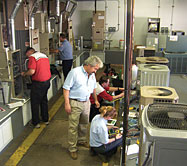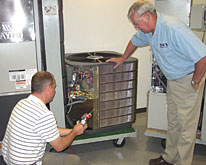
Well-trained technicians help ensure that new equipment is installed correctly. If it isn't, the public's perception of the quality of that equipment suffers. In addition, if equipment isn't installed or repaired properly, manufacturers wind up dealing with more warranty issues than they'd like.
We asked a few manufacturers where they think tomorrow's technicians will come from. Without qualified technicians, who will properly install and service their equipment?
According to the Air-Conditioning and Refrigeration Institute (ARI), an additional 20,000 technicians and installers are needed each year to work in this multibillion-dollar industry.
"Heating and cooling products are mysterious technologies to the majority of today's consumers, and they rely solely on technical support," said Drew Fitzgerald, vice president of marketing, residential and light commercial, Nordyne. "Unfortunately, many consumers are unaware of how the products function, or the types of product features and accessories available to improve the comfort level in their homes. The burden is on the technician to resolve the consumer's comfort problems."
Teaching a technician to ask the right questions is an example of training beyond the technical skill level, said Fitzgerald. "With this type of skill, technicians create a positive impression for the contractor business as well as the HVAC industry."
"The contractors and the technicians really are the final quality of our product," said Tim Neeley, manager of Engineering Technical Services, Bryant. "It's really the final quality check." The goal is to create competent technicians who will serve as HVAC consultants.
Recruiting, Partnering
"The key to the recruitment and training of qualified technicians is for manufacturers, dealers, and distributors to encourage training beyond the technical level," said Fitzgerald. "Training that addresses how to communicate and interact with consumers on multiple levels improves closure rates, retention, and growth."Several HVAC manufacturers have partnered with ARI in an effort to recruit and retain tomorrow's professionals. Keith Skipper, manager of Nordyne's Customer Service Group, is responsible for leading the company's training efforts. He also is an active member of the ARI Education and Training Committee, whose mission is to assist HVACR training programs nationwide to strengthen vocational and technical school education for entry-level technicians who in-stall, service, and maintain HVACR equipment. It combines the re-sources of manufacturers, contractors, wholesalers, educators, and others in an ongoing program of upgrading technician competency.
"As an HVAC manufacturer, Nordyne is working closely with the ARI to encourage young people to choose HVAC as their professions," said Skipper. "Together, we are reaching out to school leadership and guidance counselors to get in front of young people with our industry messages."
The manufacturer is looking for tomorrow's technicians in schools. "We are starting at the middle-school level," said Skipper. "There are bright, mechanically minded young people who may not want to pursue a four-year bachelor's degree or enter the engineering field. They are more suited for a technical trade position. HVAC industry is a viable option."
Nordyne said it networks with various state licensing agencies to provide continuing education credits. The manufacturer is also actively involved with North American Technician Excellence (NATE), which provides nationwide testing and certification for technicians.
Jeff Goen, communications manager for Bryant, agreed. "The NATE program helps us benchmark technicians. We do leverage NATE in our advertising. We feel that it's very important."

SkillsUSA
Manufacturer educational involvement has been active for many years before NATE was formed. "My whole department is involved with SkillsUSA," said Neeley. "We have been for 30 years. I've been heavily involved for over 10 years. I'm responsible for all the technical service representatives for Bryant. Everybody participates at the national and state levels. I'm the state chairman for Indiana."They are absolutely essential, not only for the HVAC trades but all trades," Neeley said of SkillsUSA.
"It actually gives some leadership for our trade, and it's a good focus point to bring people into our trade. They look at the whole educational package, too. You can get a well-rounded education and be ex-posed to a lot of different trades."
"On the national level, we've always had a full competition," Neeley said. "On the state level, it's dwindling pretty radically. The trend has been for counselors at the high school level to deem going to college as the next step. They don't look at trades as being viable."
Bryant offers some videotapes and a brochure that highlights the HVAC industry, showing all the different career paths that can be taken, Neeley said. "We also offer free equipment through local distributors to nonprofit trade schools and colleges."
The video first was distributed to all the trade schools affiliated with SkillsUSA, he said. Now it is also made available to distributors and dealers. Whether these are getting into schools, "I can't say for sure," Neeley said. "All I know is there is a good demand for it."
Bryant also rewards its distributors for the effort they put into supporting vocational-technical education, he added. The winner of this year's Service Excellence Award (SEA) was Contractors Supply, Bryant's distributor in Utah. "With our SEA award, we recognize distributors for their involvement with NATE. We see how people benchmark through NATE. We believe this is one of the better things to happen in our industry."

Raw Rookies To Trained Techs
Rick Kincel is an instructional designer for HVAC Learning Solutions (HLS, a merger of Lennox Industries Training Network and former leaders of International Service Leadership). Although it is now officially affiliated with Lennox, the technical training center will provide 900 student slots over the next three years for ISL members."It seems to be going very, very well," said Kincel of the merger. "We're getting the best of both worlds. Lennox had some remarkable training but its delivery was hard for a contractor to try and pin down. There was just such a multitude of training - there were no prerequisites. As an owner, I would be very confused trying to send a young person and have them play catch-up."
HLS offers one-week developmental classes. "It gives a better path for technicians," he said. Total career paths go from 2-1/2 to 3 years - and that's taking a person with no previous training. It follows ISL's career triangle.
"We can take a person who is absolutely raw" and turn them into a trained, functional service tech, Kincel said. The one-month Build-A-Tech program "takes that raw person and runs them through all the basic courses; then maintenance, flat-rate pricing, and CFC certification; then 60-percent lab, 40-percent classroom.
"Students touch close to 50 maintenances and startups on equipment," he said. "They have to do presentations to customers as well, and learn how to fill out an invoice."
The cost for the whole package is $5,000, "but here's what comes out of it," Kincel said. As a contractor, "I used to send guys to UTI and all over the United States for training. I would get back a guy who had theory in his head but not in his hands."
This would need to be supported by on-the-job training. "It takes about six months to a year before an install helper becomes useful," Kincel said. "There's $1,500 that I've spent on this guy to become basically useful."
Moreover, "You don't have to guess what [HLS] class the technician needs to go to. If you hire someone who has five years' experience, we use needs assessment." Techs take multiple-choice tests to assess their theoretical and practical knowledge, "from very basic up through stronger classes," Kincel said. "We find out what they're strong in, what they're weak in.
"We have five self-study courses that are prerequisites to the classes," he added. "This also saves the contractor's money and time. We find out if the technician is willing to invest in him or herself."
Feedback
HSL guarantees that if a contractor doesn't get back the kind of training he expected, he gets a full refund. Of course, the trainer takes steps to make sure the contractor gets feedback on his investment (the tech) all along the way."Every Friday, the owner or general manager is called and given an update," Kincel said. One student, for instance, had a phobia of being in confined spaces. This is something that might not have been apparent in more traditional training, and might not have been reported back to the boss. The owner also is given regular updates on attendance and whether or not the student follows the dress code.
"They need to know what they're investing their money into," Kincel said. "Some students are strong on theory and can't put it into practical use; others are strong on practical use and not strong on theory."
"We've had repeat customers," Kincel continued. "We teach need-to-know information, not nice-to know information - stuff that gets them out there on the job and productive."
At the end of two separate one-month programs, students were given NATE certification exams, he said. The pass rate for each was 50 percent. That speaks volumes about the school's efficacy.
"This program is something that we know works," Kincel said.
Nine developmental courses have been set up in Albany, N.Y.; Calgary, Alberta; Chicago; Columbus, Ohio; Dallas; Kansas City, Mo.; Orlando, Fla.; Phoenix; and Toronto. (For more information, contact Kincel - rick.kincel@hvaclearningsolutions.com.)
Training For Quality
"The skills required to be an HVAC technician today are more complex than simply knowing how to install a furnace or air conditioning unit," said Nordyne's Skipper."There are numerous considerations and choices to be made when installing HVAC equipment. From duct sizing and air management to health issues, today's technicians must be extremely knowledgeable when developing a home system.
"In addition, HVAC components are becoming more technically complex and consumers are requesting additional accessories, like HEPA filters, electronic air cleaners, zoning systems, and humidity control," Skipper said.
"The HVAC industry offers an ongoing learning curve and today's technicians need to adapt to and progress with industry advancements."
Publication date: 08/29/2005

Report Abusive Comment